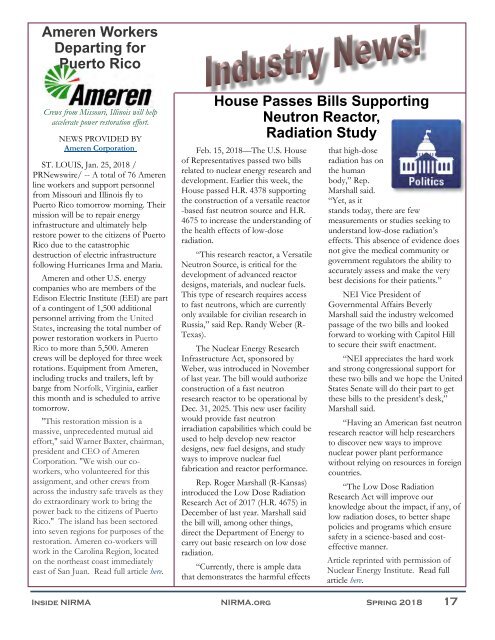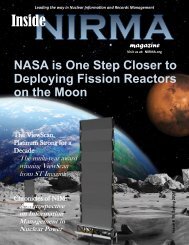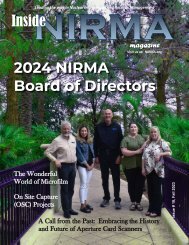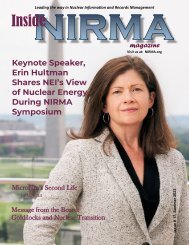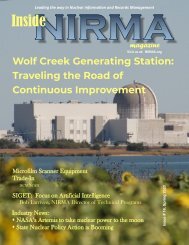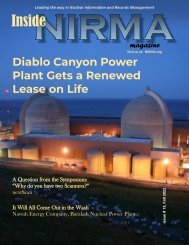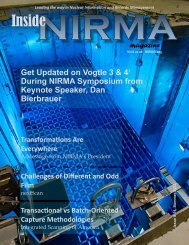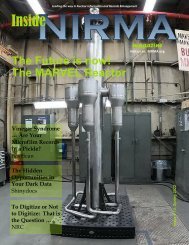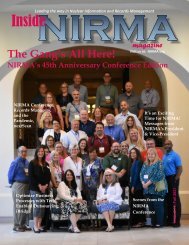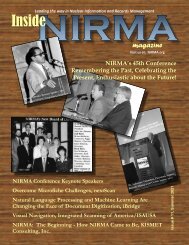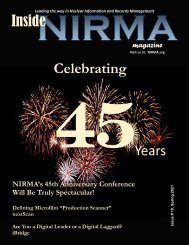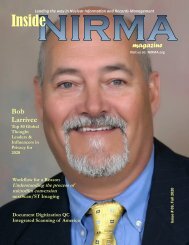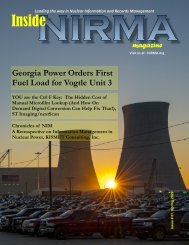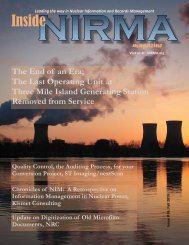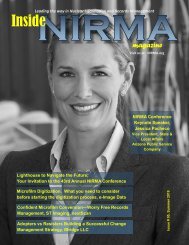Inside NIRMA - Spring March 2018 Issue
You also want an ePaper? Increase the reach of your titles
YUMPU automatically turns print PDFs into web optimized ePapers that Google loves.
Ameren Workers<br />
Departing for<br />
Puerto Rico<br />
Crews from Missouri, Illinois will help<br />
accelerate power restoration effort.<br />
NEWS PROVIDED BY<br />
Ameren Corporation<br />
ST. LOUIS, Jan. 25, <strong>2018</strong> /<br />
PRNewswire/ -- A total of 76 Ameren<br />
line workers and support personnel<br />
from Missouri and Illinois fly to<br />
Puerto Rico tomorrow morning. Their<br />
mission will be to repair energy<br />
infrastructure and ultimately help<br />
restore power to the citizens of Puerto<br />
Rico due to the catastrophic<br />
destruction of electric infrastructure<br />
following Hurricanes Irma and Maria.<br />
Ameren and other U.S. energy<br />
companies who are members of the<br />
Edison Electric Institute (EEI) are part<br />
of a contingent of 1,500 additional<br />
personnel arriving from the United<br />
States, increasing the total number of<br />
power restoration workers in Puerto<br />
Rico to more than 5,500. Ameren<br />
crews will be deployed for three week<br />
rotations. Equipment from Ameren,<br />
including trucks and trailers, left by<br />
barge from Norfolk, Virginia, earlier<br />
this month and is scheduled to arrive<br />
tomorrow.<br />
"This restoration mission is a<br />
massive, unprecedented mutual aid<br />
effort," said Warner Baxter, chairman,<br />
president and CEO of Ameren<br />
Corporation. "We wish our coworkers,<br />
who volunteered for this<br />
assignment, and other crews from<br />
across the industry safe travels as they<br />
do extraordinary work to bring the<br />
power back to the citizens of Puerto<br />
Rico." The island has been sectored<br />
into seven regions for purposes of the<br />
restoration. Ameren co-workers will<br />
work in the Carolina Region, located<br />
on the northeast coast immediately<br />
east of San Juan. Read full article here.<br />
House Passes Bills Supporting<br />
Neutron Reactor,<br />
Radiation Study<br />
Feb. 15, <strong>2018</strong>—The U.S. House<br />
of Representatives passed two bills<br />
related to nuclear energy research and<br />
development. Earlier this week, the<br />
House passed H.R. 4378 supporting<br />
the construction of a versatile reactor<br />
-based fast neutron source and H.R.<br />
4675 to increase the understanding of<br />
the health effects of low-dose<br />
radiation.<br />
“This research reactor, a Versatile<br />
Neutron Source, is critical for the<br />
development of advanced reactor<br />
designs, materials, and nuclear fuels.<br />
This type of research requires access<br />
to fast neutrons, which are currently<br />
only available for civilian research in<br />
Russia,” said Rep. Randy Weber (R-<br />
Texas).<br />
The Nuclear Energy Research<br />
Infrastructure Act, sponsored by<br />
Weber, was introduced in November<br />
of last year. The bill would authorize<br />
construction of a fast neutron<br />
research reactor to be operational by<br />
Dec. 31, 2025. This new user facility<br />
would provide fast neutron<br />
irradiation capabilities which could be<br />
used to help develop new reactor<br />
designs, new fuel designs, and study<br />
ways to improve nuclear fuel<br />
fabrication and reactor performance.<br />
Rep. Roger Marshall (R-Kansas)<br />
introduced the Low Dose Radiation<br />
Research Act of 2017 (H.R. 4675) in<br />
December of last year. Marshall said<br />
the bill will, among other things,<br />
direct the Department of Energy to<br />
carry out basic research on low dose<br />
radiation.<br />
“Currently, there is ample data<br />
that demonstrates the harmful effects<br />
that high-dose<br />
radiation has on<br />
the human<br />
body,” Rep.<br />
Marshall said.<br />
“Yet, as it<br />
stands today, there are few<br />
measurements or studies seeking to<br />
understand low-dose radiation’s<br />
effects. This absence of evidence does<br />
not give the medical community or<br />
government regulators the ability to<br />
accurately assess and make the very<br />
best decisions for their patients.”<br />
NEI Vice President of<br />
Governmental Affairs Beverly<br />
Marshall said the industry welcomed<br />
passage of the two bills and looked<br />
forward to working with Capitol Hill<br />
to secure their swift enactment.<br />
“NEI appreciates the hard work<br />
and strong congressional support for<br />
these two bills and we hope the United<br />
States Senate will do their part to get<br />
these bills to the president’s desk,”<br />
Marshall said.<br />
“Having an American fast neutron<br />
research reactor will help researchers<br />
to discover new ways to improve<br />
nuclear power plant performance<br />
without relying on resources in foreign<br />
countries.<br />
“The Low Dose Radiation<br />
Research Act will improve our<br />
knowledge about the impact, if any, of<br />
low radiation doses, to better shape<br />
policies and programs which ensure<br />
safety in a science-based and costeffective<br />
manner.<br />
Article reprinted with permission of<br />
Nuclear Energy Institute. Read full<br />
article here.<br />
<strong>Inside</strong> <strong>NIRMA</strong> <strong>NIRMA</strong>.org <strong>Spring</strong> <strong>2018</strong> 17


